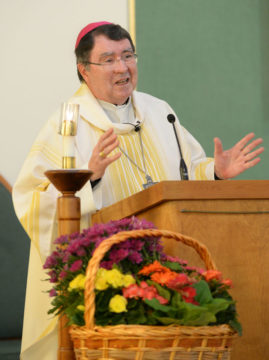Who is my neighbor? The Gospel this Sunday answers this question. We offer a Franciscan Gospel reflection and questions written by Fr. Paul Gallagher, OFM for your prayer. They are edited by Franciscan Sister of Christian Charity Sister Anne Marie Lom and Joe Thiel. The excerpts from the Sunday readings are prepared by Joe Thiel. To read or download the complete pdf with excerpts for your prayer, please click here: Franciscan Gospel Reflection July 14 2019. Excerpts are from the Lectionary for Mass for Use in the Dioceses of the United States of America, second typical edition © 2001, 1998, 1997, 1986, 1970 Confraternity of Christian Doctrine, Inc., Washington, DC. Used with permission. All rights reserved. No portion of this text may be reproduced by any means without permission in writing from the copyright owner. Please include this information when printing. Photos from Franciscan Sisters of Christian Charity 150th Anniversary visit from Apostolic Nuncio Archbishop Christophe Pierre and Diocese of Green Bay Bishop David Ricken by Benjamin Wideman
Luke 10:25-37
There was a scholar of the law who stood up to test him and said, “Teacher, what must I do to inherit eternal life?” Jesus said to him, “What is written in the law? How do you read it?” He said in reply, “you shall love the Lord, your God, with all your heart, with all your being, with all your strength, and with all your mind, and your neighbor as yourself.” He replied to him, “you have answered correctly; do this and you will live.”
But because he wished to justify himself, he said to Jesus, “And who is my neighbor?” Jesus replied, “A man fell victim to robbers as he went down from Jerusalem to Jericho. They stripped and beat him and went off leaving him half-dead. A priest happened to be going down that road, but when he saw him, he passed by on the opposite side. Likewise a Levite came to the place, and when he saw him, he passed by on the opposite side. But a Samaritan traveler who came upon him was moved with compassion at the sight. He approached the victim, poured oil and wine over his wounds and bandaged them. Then he lifted him upon his own animal, took him to an inn, and cared for him. The next day he took out two silver coins and gave them to the innkeeper with the instruction, ‘Take care of him. If you spend more than what I have given you, I shall repay you on my way back.’
“Which of these three, in your opinion, was neighbor to the robbers’ victim?” He answered, “The one who treated him with mercy.” Jesus said to him, “Go and do likewise.”
Background
At the conclusion of last Sunday’s gospel, Jesus greets the returning seventy-two and tells them to rejoice not in what they have accomplished, but in having their names written in heaven. (Luke 10:20) Jesus then praises God for revealing to the childlike what has been hidden from the wise and the learned. In private he tells the disciples, “Blessed are the eyes that see what you see. For I say to you, many prophets and kings desired to see what you see, but did not see it, and to hear what you hear, but did not hear it.” (Luke 10:24) Then Luke’s gospel describes Jesus’ encounter with a student of the law, which is the text for this Sunday’s gospel.
Generally, throughout the gospel, when people approach Jesus with a question, they do so in order to embarrass or discredit Him. Jesus’ response to these people often leaves them being the ones who are disgraced. This meeting with the scholar of the law is typical of such an encounter. His intention is revealed as Luke introduces the situation, saying the scholar of the law stood up and asked a question to “test” Jesus. When Jesus gives an answer that reveals his knowledge and wisdom, he tries to save face by asking another question “to justify himself.”
The response to the first question draws on two texts from the Torah. “Hear, O Israel! The Lord is our God, the Lord alone! Therefore, you shall love the Lord, your God, with all your heart, and with all your soul, and with all your strength.” (Deuteronomy 6:4-5) “Take no revenge and cherish no grudge against your fellow countrymen. You shall love your neighbor as yourself. I am the Lord.” (Leviticus 19:18)
The parable that Jesus tells in response to the second question follows this well-known pattern: The first two people in question are unable to respond, but the audience knows that the third person is the one who will respond appropriately. As Jesus tells the parable, he selects two people that the scholar holds in high esteem. Priests were expected to live by the Torah and give a good example, and the priest in this story was presumed to be returning from serving in the temple in Jerusalem. Levites were expected to have a special love and dedication to the law. In this parable, the victim is left naked and unable to speak. He being without clothing and unconscious, those who discover him on the road are unable to detect who this unfortunate traveler might be. All three who pass are capable of helping this victim, but the first two choose not to. The priest, if he approaches and finds the person to be a non-Jew or dead, becomes ritually unclean and must return in humility to Jerusalem. If the Levite, having witnessed the priest pass by, chooses to give assistance, he would be seen as challenging the priest’s decision not to give assistance. He too chooses to continue without stopping.
The point of the story is that the third person is a Samaritan. The audience expects this third person to be the one who can right the situation. They also expect that it will be one of their own. The fact that Jesus makes this person a Samaritan was unthinkable. By choosing to assist, the Samaritan places himself in a very vulnerable position. If the traveler dies and the robbers are not found, according to their social norms the family can hold him responsible. If the traveler lives, he may become upset that the Samaritan has made him ritually unclean by caring for him. The Samaritan is not deterred from this difficult situation, and he seems to be willing to accept the consequences of his actions. He informs the innkeeper that he will return to take full responsibility for his decision to help this traveler.
The scholar and the people who hear Jesus tell this parable are told to follow the example of the Samaritan!
Reflection Questions
1. Have you ever wondered, like this lawyer, what it is you need to do to receive eternal life?
2. Do you think of eternal life as something you receive, you work to achieve, you hope God will find you worthy of, you do not like to think about…
3. Imagine that you are present when this lawyer approaches and asks Jesus what he must do to inherit eternal life. What would be going on inside of you as he asks that question?
4. He used the phrase “inherit eternal life.” What does that suggest to you?
5. He then asks, “who is his neighbor?” That question sounds like he is…
6. As this encounter unfolded, I found myself…
7. When at the end of the text Jesus tells the lawyer to go and do the same, I felt…
8. Can you take some time to talk to God about your hopes, questions, concerns about eternal life, or some other thought or feeling that arose in you from his gospel text?





